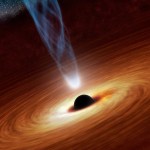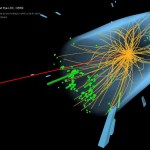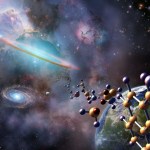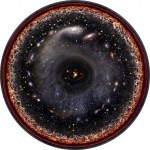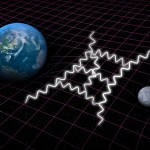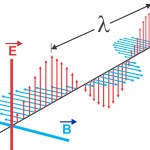ask Ethan
"I long ago abandoned the notion of a life without storms, or a world without dry and killing seasons. Life is too complicated, too constantly changing, to be anything but what it is. And I am, by nature, too mercurial to be anything but deeply wary of the grave unnaturalness involved in any attempt to exert too much control over essentially uncontrollable forces." -Kay Redfield Jamison
Under ideal conditions, Mercury achieves a maximum elongation, or angular separation, from the Sun of 28 degrees. Total darkness is achieved when the Sun dips 18 degrees below the horizon. So for many of us,…
“It is conceptually interesting, if not astrophysically very important, to calculate the precise apparent shape of the black hole... Unfortunately, there seems to be no hope of observing this effect.” -Jim Bardeen
Black holes were one of the first consequences of general relativity that were predicted to exist, and the more we’ve studied the Universe, the more interesting they’ve become. We’ve calculated their physical sizes, their effects on the curvature of spacetime, their apparent angular sizes, and the properties of matter that gets caught in an accretion disk around them. But we’re…
"Entropy shakes its angry fist at you for being clever enough to organize the world." -Brandon Sanderson
The universe was born hot, dense, expanding, full of matter, antimatter and radiation... and in a low-entropy state. If entropy is a measure of disorder, though, that sure does sound like an awfully high-entropy state, not a low-entropy one. So why, when we talk about the Universe, do we say that the early Universe had such low entropy?
Our Universe, from the hot Big Bang until the present day, underwent a huge amount of growth and evolution, and continues to do so. Image credit: NASA /…
"There is a limit on how much information you can keep bottled up." -Dick Gregory
There are fundamental limits to the Universe, in the sense that there are scales where our laws of physics break down. You can't break matter or energy up into infinitely small pieces, and the same goes -- we think -- for space and time. But is that necessarily all true, and is that what the Planck scale means? Not quite.
Although X-ray observations have set limits on the granularity of space, they have not probed anywhere near down to the Planck scale. Image credit: X-ray: NASA/CXC/FIT/E. Perlman; Illustration…
"The layman always means, when he says "reality" that he is speaking of something self-evidently known; whereas to me it seems the most important and exceedingly difficult task of our time is to work on the construction of a new idea of reality." -Wolfgang Pauli
On the surface, it shouldn’t appear to make all that much difference to the Universe whether a particle has a spin in half-integer intervals (±1/2, ±3/2, ±5/2) or in integer intervals (0, ±1, ±2). The former is what defines fermions, while the latter defines bosons. This hardly seems like an important distinction, since intrinsic…
"It is only through labor and painful effort, by grim energy and resolute courage, that we move on to better things." -Theodore Roosevelt
Energy is a fundamental property of nature, and yet it’s also one of the most purely understood phenomena from a conceptual point of view. Some objects have energy inherently, such as in the form of rest mass. Other types of energy include binding energy, which is negative, and kinetic energy, which is the energy of motion. Regardless of the form it appears in, energy cannot exist without being attached to some other physical phenomenon.
As two neutron…
"The Universe is expanding the way your mind is expanding. It's not expanding into anything; you're just getting less dense." -Katie Mack
It's a thing of scientific beauty that we've not only been able to determine that the Universe is expanding, but that we've been able to measure the rate of expansion so incredibly well. To better than 90% uniformity, we've determined the expansion rate in all directions and going back billions of years, allowing us to determine what's in the Universe, how that's changed over time, and what its fate is. It's one of the most remarkable achievements of modern…
"For the first time we can learn about individual stars from near the beginning of time. There are surely many more out there." -Neil Gehrels
We know what NASA’s James Webb and WFIRST are designed for, and we know what we expect to find. James Webb will be the largest space telescope ever, focused mostly on infrared observations probing exoplanets, star-forming nebulae, galaxy evolution and the first stars and galaxies in the Universe. WFIRST will be just like Hubble, except with better instruments and 100 times the field-of-view.
The Hubble eXtreme Deep Field, our deepest view of the…
"The history of astronomy is a history of receding horizons." -Edwin Hubble
As you look to greater and greater distances, you’re looking back in time in the Universe. But thanks to dark energy, what we can see and access today isn’t always going to be accessible. As galaxies grow more distant with the accelerated expansion of the Universe, they eventually recede faster than the speed of light. At present, 97% of the galaxies in the Universe aren’t reachable by us, even at the speed of light.
The observable (yellow) and reachable (magenta) portions of the Universe, which are what they are…
"I really didn't have to work, shall we say, with Star Trek. It was a natural. When I opened my mouth, there was Scotty. It's like I tell people what you see in Scotty is 99% James Doohan and 1% accent." -James Doohan
So, your friend on the USS Enterprise beamed you aboard, took you on a relativistic journey at impulse speeds around the Solar System, and brought you back to your starting point. You find that less time has passed for you than your family who remained on Earth, yet you’ve traveled a much greater distance. How does this all work?
Moving close to the speed of light results in…
“I want to stand as close to the edge as I can without going over. Out on the edge you see all the kinds of things you can’t see from the center.” -Kurt Vonnegut
We all know how explosions work: a tremendous release of energy causes a rapid outward expansion, and the most energetic particles get flung the farthest and at the greatest speeds. Things fly apart, spread out, and wind up a tremendous distance away. And within our Universe, nothing has ever released more energy than the event that started it all: the Big Bang.
An explosion in space would have the outermost material move away the…
"For the first time, astronomers have outlined and named the network of galaxies that includes the Milky Way, adding a line to our cosmic address and further defining our place in the universe." -Douglas Quenqua
There’s been a longstanding puzzle in astrophysics that’s finally coming to a head. For nearly a century, we’ve known that our Universe is expanding, and that the distance to a galaxy determines its average apparent recessional speed from us. But on top of that is an additional motion -- a peculiar velocity -- caused by the local gravitational field of the Universe.
A two-dimensional…
"'Space-time' - that hideous hybrid whose very hyphen looks phoney." -Vladimir Nabokov
Sure, you know what space and time are. If you heard of Einstein and relativity, you might know that they’re not absolute quantities, but that how you experience distances and the ticking of clocks is dependent on your motion through the Universe. But did you also know that the addition of masses and gravitation to the theory didn’t just result in general relativity, but changed the way we viewed the Universe completely?
Quantum field theory calculations are normally done in flat space, but general…
"It was a strange lightness, a drifting feeling. Zero gravity. I understood that everything that once seemed solid and immovable might just float away." -Lisa Unger
If you want to experience zero gravity, all you need to do is go to space, turn your rocket off and feel that weightless sensation, right? Except, from up there in Earth’s orbit, the gravitational force on you is still almost as great as it is on Earth’s surface! You still accelerate down towards the center of the Earth, not quite at 9.8 m/s^2, but not by much less.
Astronauts, and fruit, aboard the International Space Station.…
"Lives are snowflakes - unique in detail, forming patterns we have seen before, but as like one another as peas in a pod (and have you ever looked at peas in a pod? I mean, really looked at them? There's not a chance you'd mistake one for another, after a minute's close inspection.)" -Neil Gaiman
When you see a snowflake, what you're seeing is a thin crystal of ice, with intricate, hexagonally-symmetric features that reveal themselves under a microscope. Although snowflakes come in a myriad of different shapes and patterns, there's one adage you've heard since you were a kid: that no two…
“We are part of the universe that has developed a remarkable ability: We can hold an image of the world in our minds. We are matter contemplating itself.” -Sean Carroll
If you take a look at our Universe today, you can learn all sorts of things about it. How the matter in it is distributed, what the radiation is doing, how many and what types of black holes we’ve formed, how much entropy there is, etc. You can also learn how all of those things are evolving into the future and how they were different in the past!
The far distant fates of the Universe offer a number of possibilities, but if…
"It's a brilliant surface in that sunlight. The horizon seems quite close to you because the curvature is so much more pronounced than here on earth. It's an interesting place to be. I recommend it." -Neil Armstrong
There are many impressive optical phenomena that we can see with our own eyes here on Earth. The right configuration of raindrops or ice crystals can produce rainbows, shining light through a prism will separate it into its individual wavelengths, and from high altitudes in the pre-sunrise or post-sunset skies, a full spectrum of colors become visible.
From very high altitudes in…
“The very closest stars would require many years to visit, even traveling at the speed of light, which is impossible according to Einstein’s theory of relativity. Today’s fastest spaceships would require 200,000 years to travel to Alpha Centauri, our closest bright star. The energy required to send a hundred colonists to another star, as Frank Drake has pointed out, would be enough to meet the energy needs of the entire United States over a human lifetime. And these estimates are regarding nearby stars. When we consider the distances across the entire galaxy, and between galaxies,…
"Each ray of light moves in the coordinate system 'at rest' with the definite, constant velocity V independent of whether this ray of light is emitted by a body at rest or a body in motion." -Albert Einstein, 1905
The more kinetic energy you impart to something, the faster you go. But there’s a limit: the speed of light in a vacuum. In fact, if you have any mass at all, you’ll never reach it; if you have no mass, it’s the only speed you can travel at. But why is it finite instead of infinite? Why does it have the particular value it has? And why couldn’t it be faster or slower under different…
"It is old age, rather than death, that is to be contrasted with life. Old age is life's parody, whereas death transforms life into a destiny: in a way it preserves it by giving it the absolute dimension. Death does away with time." -Simone de Beauvoir
If you want to describe your location here on Earth, only two values are usually sufficient: one for your latitude and one for your longitude. This is because the surface of the Earth is two dimensional, and you’re generally not either underground or airborne; if you are, a third value, representing your altitude, is also necessary.
On the…

